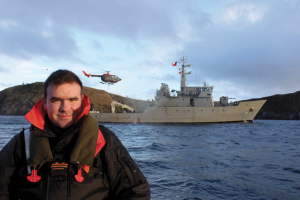REGULUS keeps sailors’ skills sharp
By Lookout on Jan 12, 2015 with Comments 0
“REGULUS is about getting young men and women of the RCN to sea during a period of reduced sailing opportunities” – Link
It’s said that a ship is only as strong as its crew: skills, experience and proficiency are critical for all ranks and sea trades, and for the operational excellence of a navy as a whole.
When the Royal Canadian Navy (RCN) was anticipating limited at-sea experience for some sailors as the Halifax-class Modernization (HCM) program was kicking into gear, they looked to the REGULUS program.
“REGULUS is about getting young men and women of the RCN to sea during a period of reduced sailing opportunities,” said Lt(N) Arthur Halpenny, REGULUS’ new Personnel Coordinator.
Through personnel exchanges with friendly navies around the world, Canadian sailors hone their skills and gain valuable experience while sailing on board foreign vessels, strengthening the RCN’s core competencies.
REGULUS addressed a challenge posed by the Halifax-class Modernization (HCM) program.
With many of the RCN’s Halifax-class frigates – dubbed the “backbone” of the Canadian fleet – going through modernization work, the RCN was challenged with keeping its sailors ready for operations as Canadian platforms became less available for training or deployment.
Since the REGULUS inception in 2010, more than 150 RCN personnel have been sent abroad to countries such as the United States, New Zealand, Australia, the United Kingdom, and Chile.
“The exchanges are mutually beneficial. If possible, we’ll place our sailors in billets that the partner navy may have trouble filling. Partner navies, in turn, often seek RCN training once they witness the talent and professionalism of our sailors.”
But the benefits go beyond simply keeping sailors well-trained. In the 21st century, successful maritime operations depend upon partnerships and coalitions.
Programs such as REGULUS build bridges between like-minded navies, allowing them to work together to confront and deter threats to maritime security.
“The young Canadian and allied sailors who bond on these adventures will be the institutional leaders of tomorrow,” said Lt(N) Halpenny.
SLt Chris Sulyma participated in an exchange with the Chilean Navy in April of this year and found himself on board an auxiliary patrol ship tasked with fishery patrol, lighthouse resupply and search and rescue operations off Chile’s southern coast.
“I found the Chilean officers and crew to be extremely friendly, eager to help, and genuinely curious about Canadian culture,” said SLt Sulyma.
“The ship itself helped us celebrate Canada Day, and the local restaurant went so far as to learn how to make poutine for us… we also celebrated the ups and mourned the downs of Chile’s soccer team in its drive for the World Cup.”
However, working in a foreign country does bring with it some challenges.
Many of those sent on exchange have experienced homesickness or culture shock to varying degrees, whether it’s struggling to learn a new language or adjusting to a military culture different than the RCN.
“There were times where I questioned why I had volunteered, but I was down south with some great people, and made some amazing friends who I still speak to today on a regular basis,” said SLt Sulyma of his experience.
With several frigates having completed their modernization work and the remaining pre-HCM ones beginning theirs, the HCM program is moving along at an impressive pace.
However, due to its resounding success, REGULUS is slated to continue on for years to come.
Jamie Cook
MARPAC PA
Filed Under: Top Stories
About the Author:






